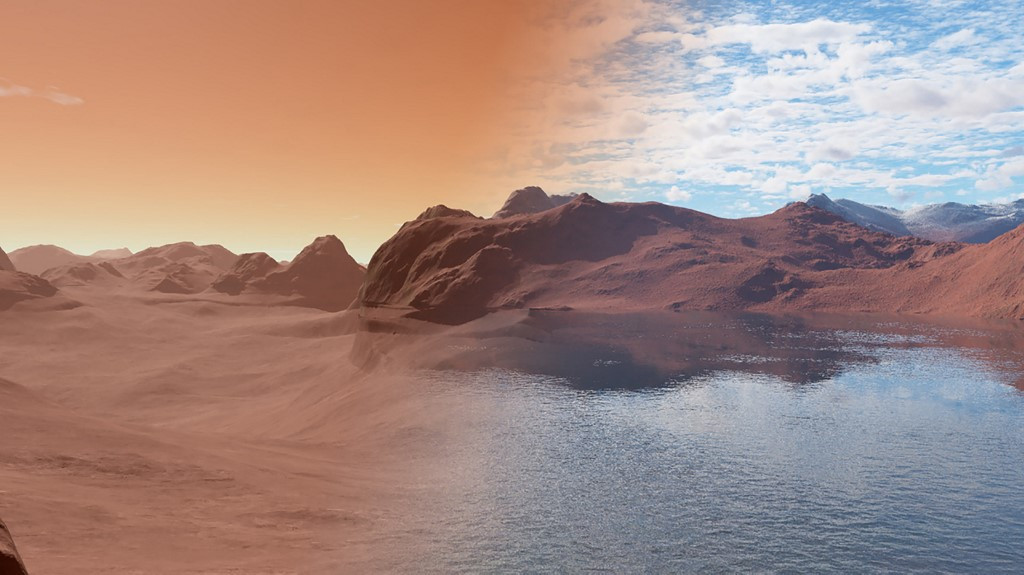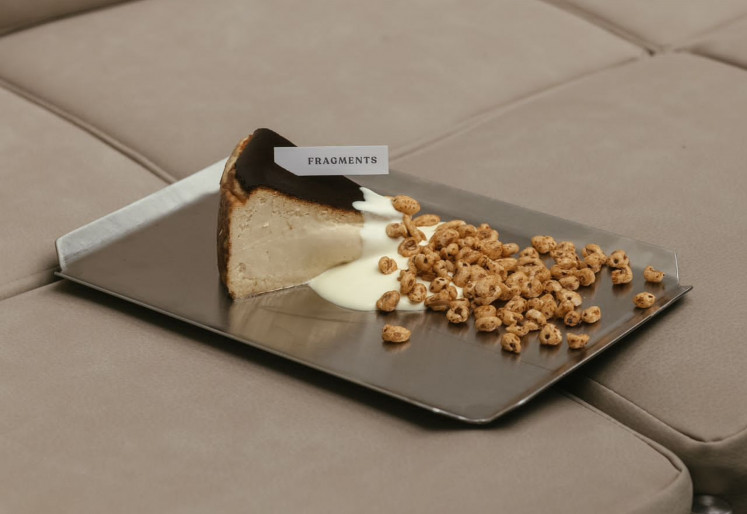Popular Reads
Top Results
Can't find what you're looking for?
View all search resultsPopular Reads
Top Results
Can't find what you're looking for?
View all search resultsMars' 'missing' water is buried beneath surface: study
Change text size
Gift Premium Articles
to Anyone
 This handout picture released on December 19, 2017 by Nature Communication shows Mars through time : Current Mars, red, dead and dry on the left, in contrast with the same landscape covered in water, early in the planet's history, over 3 billion years ago. (Agence France Presse/Jon WADE, James MOORE / NATURE PUBLISHING GROUP )
This handout picture released on December 19, 2017 by Nature Communication shows Mars through time : Current Mars, red, dead and dry on the left, in contrast with the same landscape covered in water, early in the planet's history, over 3 billion years ago. (Agence France Presse/Jon WADE, James MOORE / NATURE PUBLISHING GROUP )
B
illions of years ago, Mars was home to lakes and oceans -- but where all the water went to transform the planet into the desolate rock we know today has been something of a mystery.
Most of it was thought to have been lost to space, but a new study funded by NASA proposes that it didn't go anywhere but is trapped within minerals in the crust.
"We're saying that the crust forms what we call hydrated minerals, so minerals that actually have water in their crystal structure," Eva Scheller, lead author of the new paper in Science, told AFP.
In fact, Scheller's model suggests anywhere between 30 - 99 percent of the initial water remains trapped inside these minerals.
Early Mars was thought to have enough water to cover the whole planet in roughly 100 to 1,500 meters (330 to 4,4920 feet) of ocean.
Because the planet lost its magnetic field early in its history, its atmosphere was progressively stripped away, and it was assumed this was how it lost its water.
But the authors of the new study believe that while some of the water did disappear, the majority remained.
Using observations made by Mars rovers as well as of meteorites from the planet, the team focused on hydrogen, a key component of water.
There are different kinds of hydrogen atoms. Most have just one proton in their nucleus, but a tiny fraction, about 0.02 percent, have both a proton and a neutron, making them heavier. These are known as deuterium, or "heavy" hydrogen.
Because the lighter kind escapes the planet's atmosphere at a faster rate, the loss of most of the water to space would leave relatively more deuterium behind.
But given how much water the planet is believed to have started with, and the current rate of hydrogen escape observed by spacecraft, the current deuterium-to-hydrogen ratio cannot be explained by atmospheric loss alone.
Permanent loss
The study's authors instead say there was a combination of two mechanisms: the trapping of water in minerals in the planet's crust as well as the loss of water to the atmosphere.
"Anytime that you have a rock and it's interacting with water, there's a series of very complex reactions that form a hydrated mineral," said Scheller.
This process, called "chemical weathering," also takes place on Earth -- for example, in clay, also found on Mars.
But on our planet volcanoes recycle the water back into the atmosphere. Mars, however, doesn't have tectonic plates, making the changes permanent.
According to the teams' simulations, the planet lost between most of its water between four to 3.7 billion years ago, which means "Mars was pretty much like we see how it is today for the past three billion years," said Scheller.
She added she was excited about what the Perseverance rover, which landed last month for a multiyear science mission on the planet, might be able to contribute to the area of research.
"The Perseverance rover is actually going to investigate exactly these processes and reactions that cause the sequestration of water in the crust," she said.
The team's model contains multiple scenarios, which they to compare to new data acquired by the rover.
"We can start to say, 'These parts of the model aren't working right and these parts are' and that's going to help us get closer and closer and closer to the answer," said Scheller.










